
Marxism–Leninism is a communist ideology that became the largest faction of the communist movement in the world in the years following the October Revolution. It was the predominant ideology of most communist governments throughout the 20th century. It was developed in Russia by Joseph Stalin and drew on elements of Bolshevism, Leninism, Marxism, and the works of Karl Kautsky. It was the state ideology of the Soviet Union, Soviet satellite states in the Eastern Bloc, and various countries in the Non-Aligned Movement and Third World during the Cold War, as well as the Communist International after Bolshevization.
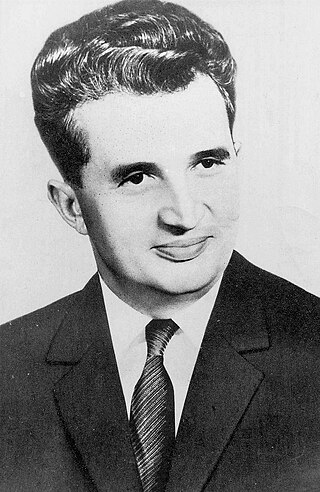
Nicolae Ceaușescu was a Romanian politician who was the second and last communist leader of Romania, serving as the general secretary of the Romanian Communist Party from 1965 to 1989. Widely classified as a dictator, he was the country's head of state from 1967 to 1989, serving as President of the State Council from 1967 and as the first President of the Republic from 1974. He was overthrown and executed in the Romanian Revolution in December 1989, part of a series of anti-communist uprisings in Eastern Europe that year.

The Eastern Bloc, also known as the Communist Bloc (Combloc), the Socialist Bloc, and the Soviet Bloc, was the collective term for an unofficial coalition of communist states of Central and Eastern Europe, Asia, Africa, and Latin America that were aligned with the Soviet Union and existed during the Cold War (1947–1991). These states followed the ideology of Marxism–Leninism, in opposition to the capitalist Western Bloc. The Eastern Bloc was often called the "Second World", whereas the term "First World" referred to the Western Bloc and "Third World" referred to the non-aligned countries that were mainly in Africa, Asia, and Latin America but notably also included former pre-1948 Soviet ally Yugoslavia, which was located in Europe.
The Old Left is an informal umbrella term used to describe the various left-wing political movements in the Western world prior to the 1960s. Many of these movements were Marxist movements that often took a more vanguardist approach to social justice; focused primarily on labor unionization and social class in the West. Generally, the Old Left, unlike the New, focused more on economic issues than cultural ones.

The Socialist Republic of Romania was a Marxist–Leninist one-party socialist state that existed officially in Romania from 1947 to 1989. From 1947 to 1965, the state was known as the Romanian People's Republic. The country was an Eastern Bloc state and a member of the Warsaw Pact with a dominant role for the Romanian Communist Party enshrined in its constitutions. Geographically, RSR was bordered by the Black Sea to the east, the Soviet Union to the north and east, Hungary and Yugoslavia to the west, and Bulgaria to the south.
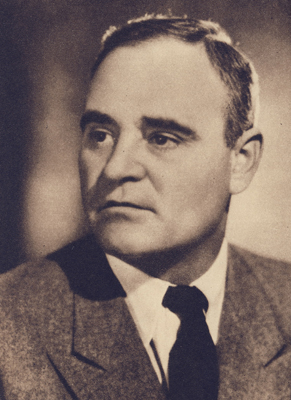
Gheorghe Gheorghiu-Dej was a Romanian politician and electrician. He was the first Communist leader of Romania from 1947 to 1965, serving as first secretary of the Romanian Communist Party from 1944 to 1954 and from 1955 to 1965, and as the first Communist Prime Minister of Romania from 1952 to 1955.

The Sino-Soviet split was the gradual worsening of relations between the People's Republic of China (PRC) and the Union of Soviet Socialist Republics (USSR) during the Cold War. This was primarily caused by doctrinal divergences that arose from their different interpretations and practical applications of Marxism–Leninism, as influenced by their respective geopolitics during the Cold War of 1947–1991. In the late 1950s and early 1960s, Sino-Soviet debates about the interpretation of orthodox Marxism became specific disputes about the Soviet Union's policies of national de-Stalinization and international peaceful coexistence with the Western Bloc, which Chinese leader Mao Zedong decried as revisionism. Against that ideological background, China took a belligerent stance towards the Western world, and publicly rejected the Soviet Union's policy of peaceful coexistence between the Western Bloc and Eastern Bloc. In addition, Beijing resented the Soviet Union's growing ties with India due to factors such as the Sino-Indian border dispute, and Moscow feared that Mao was too nonchalant about the horrors of nuclear warfare.

The New Communist Party of Britain is an anti-revisionist Marxist–Leninist communist party in Britain. The origins of the NCP lie in the Communist Party of Great Britain from which it split in 1977. The organisation takes an anti-revisionist stance on Marxist–Leninism and is opposed to Eurocommunism. After the fall of the Soviet Union the party was one of two original British signatories to the Pyongyang Declaration in 1992. It publishes a newspaper named The New Worker.

The Romanian Communist Party was a communist party in Romania. The successor to the pro-Bolshevik wing of the Socialist Party of Romania, it gave an ideological endorsement to a communist revolution that would replace the social system of the Kingdom of Romania. After being outlawed in 1924, the PCR remained a minor and illegal grouping for much of the interwar period and submitted to direct Comintern control. During the 1920s and the 1930s, most of its activists were imprisoned or took refuge in the Soviet Union, which led to the creation of competing factions that sometimes came into open conflict. That did not prevent the party from participating in the political life of the country through various front organizations, most notably the Peasant Workers' Bloc. In 1934–1936, PCR reformed itself in the mainland of Romania properly, with foreign observers predicting a possible communist takeover in Romania. The party emerged as a powerful actor on the Romanian political scene in August 1944, when it became involved in the royal coup that toppled the pro-Nazi government of Ion Antonescu. With support from Soviet occupational forces, the PCR pressured King Michael I into abdicating, and it established the Romanian People's Republic in December 1947.

The New Communist Party of the Netherlands is a communist party in the Netherlands. The NCPN was founded in 1992 by the former members of the Communist Party of the Netherlands to oppose CPN's merger into the left-wing GroenLinks. These members have been known as "the Horizontals". Through the Stichting HOC, the NCPN releases the monthly newspaper Manifest.

Communist propaganda is the artistic and social promotion of the ideology of communism, communist worldview, communist society, and interests of the communist movement. While it tends to carry a negative connotation in the Western world, the term propaganda broadly refers to any publication or campaign aimed at promoting a cause and is/was used for official purposes by most communist-oriented governments. The term may also refer to political parties' opponents' campaign. Rooted in Marxist thought, the propaganda of communism is viewed by its proponents as the vehicle for spreading their idea of enlightenment of working class people and pulling them away from the propaganda of who they view to be their oppressors, that they claim reinforces exploitation, such as religion or consumerism. Communist propaganda therefore stands in opposition to bourgeois or capitalist propaganda.
National communism is a term describing various forms in which Marxism–Leninism and socialism has been adopted and/or implemented by leaders in different countries using aspects of nationalism or national identity to form a policy independent from communist internationalism. National communism has been used to describe movements and governments that have sought to form a distinctly unique variant of communism based upon distinct national characteristics and circumstances, rather than following policies set by other socialist states, such as the Soviet Union.
Parliamentary elections, which later became known as the "blue-ballot" elections, were held in Hungary on 31 August 1947. The Hungarian Communist Party, which had lost the previous election, consolidated its power in the interim using salami tactics. Communist-led political intrigues had deprived their opposition of its democratically won mandate from 1945, as numerous prominent anti-Communists were removed from office on charges of conspiracy. These conspiracies reached a climax in late May 1947, when the Hungarian Communist Party deposed the democratically elected prime minister Ferenc Nagy in a coup d'état, removing one of the strongest opponents to their rule and crippling the opposition. This weakening of the opposition, combined with a revised electoral law, led to further Communist gains. This would be the last remotely competitive election held in Hungary until 1990.
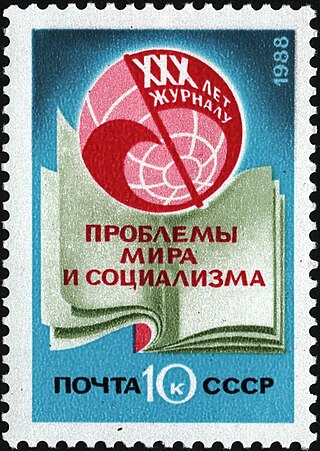
Problems of Peace and Socialism, also commonly known as World Marxist Review (WMR), the name of its English-language edition, was a monthly theoretical journal containing jointly-produced content by Communist and workers' parties from around the world, published from September 1958 to June 1990.

The Information Bureau of the Communist and Workers' Parties, commonly known as Cominform (Коминформ), was a co-ordination body of Marxist–Leninist communist parties in Europe which existed from 1947 to 1956. Formed in the wake of the dissolution of the Communist International in 1943, it did not replace that body, but instead mainly served as an expression of solidarity and as a means of disseminating Stalinist propaganda. The Cominform initially included the communist parties of the Soviet Union, Bulgaria, Czechoslovakia, Hungary, Poland, Romania, Yugoslavia, France, and Italy. The organization was dissolved in 1956, during de-Stalinization.

The Fourth International (FI), founded in 1938, is a Trotskyist international.
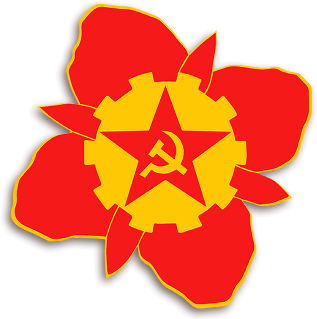
The Communist Party of Canada (Marxist–Leninist) is a federal political party in Canada. It was founded in 1970 by Hardial Bains, a staunch Stalinist and anti-revisionist. The CPC (M-L) has been registered with Elections Canada as the Marxist–Leninist Party of Canada (MLPC) since 1974, as the party is prohibited from using the name "Communist Party of Canada" in Canadian elections to avoid confusion among voters. The party is not an offshoot of the Communist Party of Canada; its early membership came from student-led organizations active in the 1960s. After a period of alignment with Maoism and China, the CPC (M-L) pursued a Hoxhaist, pro-Albanian line until the early 1990s. At present, the party directs most of its public support to Cuba and North Korea.

A popular front is "any coalition of working-class and middle-class parties", including liberal and social democratic ones, "united for the defense of democratic forms" against "a presumed Fascist assault". More generally, it is "a coalition especially of leftist political parties against a common opponent". However, other alliances such as the Popular Front of India have used the term, and not all leftist or anti-fascist coalitions use the term "popular front".
The New Left was a broad political movement that emerged from the counterculture of the 1960s and continued through the 1970s. It consisted of activists in the Western world who, in reaction to the era's liberal establishment, campaigned for freer lifestyles on a broad range of social issues such as feminism, gay rights, drug policy reforms, and gender relations. The New Left differs from the traditional left in that it tended to acknowledge the struggle for various forms of social justice, whereas previous movements prioritized explicitly economic goals. However, many have used the term "New Left" to describe an evolution, continuation, and revitalization of traditional leftist goals.
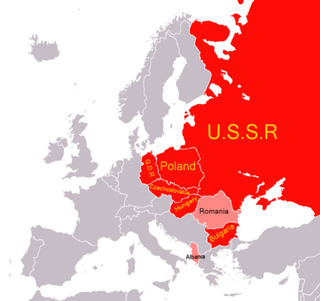
The de-satellization of the Socialist Republic of Romania from the Soviet Union was the release of Romania from its Soviet satellite status in the 1960s. The Romanian leadership achieved the de-satellization partly by taking advantage of Nikita Khrushchev's errors and vulnerabilities. Romania's independence was tolerated by Moscow because its ruling party was not going to abandon communism. Although Romania remained a member of both the Warsaw Pact and Comecon, it was not to be a docile member of either.















